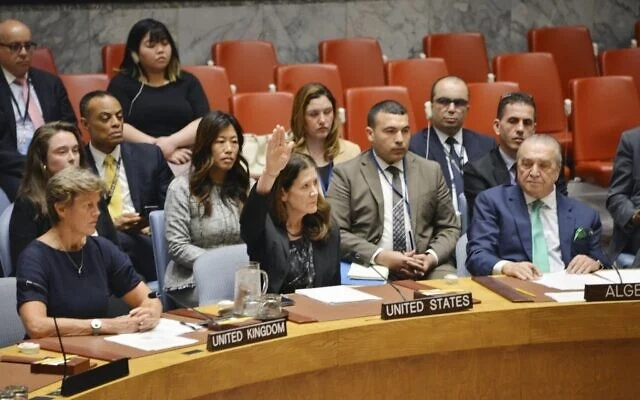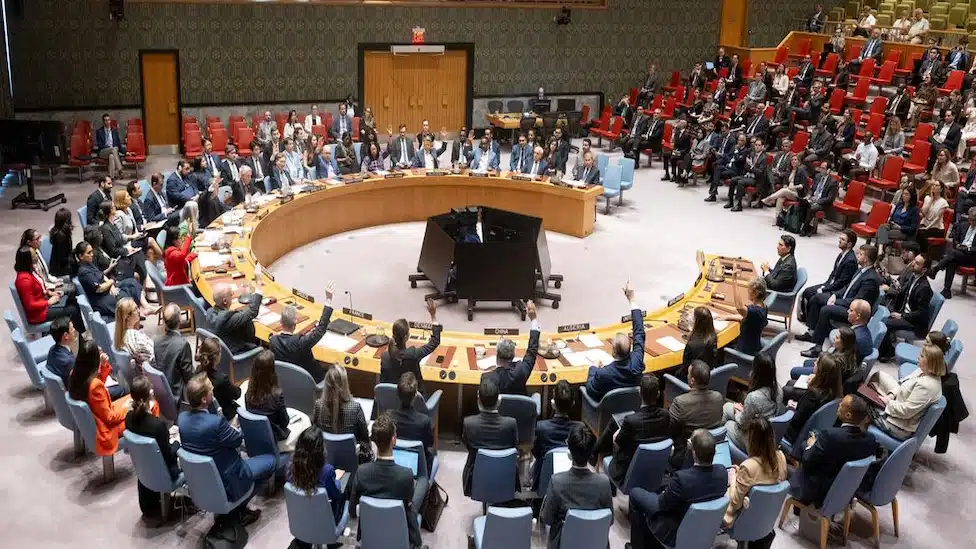Gaza Ceasefire Veto: On Wednesday, June 4, 2025, the United States vetoed a United Nations Security Council resolution that called for a Gaza ceasefire veto. The vote came as Israeli airstrikes killed nearly 100 Palestinians in 24 hours. Fourteen council members supported the resolution, but the US stood alone in opposition.
The move drew immediate global criticism. The resolution also called for the release of Israeli hostages, but the US argued the two issues must not be linked. The veto has intensified calls for action as Gaza faces worsening humanitarian conditions and rising civilian casualties.
Also Read | US Backs Plan to Integrate Foreign Fighters in the Syrian Army, Says Trump’s Envoy
Gaza Ceasefire Veto: Insights
- The Gaza ceasefire veto came amid escalating violence and mounting civilian deaths.
- 14 out of 15 UN Security Council members supported the resolution.
- Nearly 100 Palestinians were killed in Gaza in a single day before the vote.
- The US said Israel must continue to target Hamas for self-defense.
- China and other nations accused the US of shielding Israel from accountability.
- Israel expanded its military operations despite famine risks and global outrage.
- The aid system in Gaza, run partly by US-backed groups, faces harsh criticism.
- UN officials urged Israel to open all crossings and allow unrestricted aid.
- UNICEF and other groups highlighted dire conditions for children in Gaza.
- Over 54,000 Palestinians have died since the war began in October 2023.
Background
The conflict in Gaza reignited in October 2023 after a significant escalation between Israel and Hamas. Since then, Israeli military operations have intensified. Multiple attempts to broker a ceasefire have failed. Humanitarian groups have struggled to deliver aid due to Israel’s restrictions.
Previous short-term truces allowed some hostages to be freed, but fighting resumed quickly. The Gaza ceasefire veto is the first UN vote on the conflict since November 2024. The US has consistently supported Israel’s right to self-defense, while most other countries call for an immediate halt to violence.
Main Event
The United States on Wednesday vetoed a UN resolution calling for an immediate and permanent ceasefire in Gaza. Fourteen Security Council members voted in favor, but the US opposed it, blocking the measure. The resolution, introduced by ten countries, also called for the release of Israeli hostages. The US objected, saying a ceasefire should be tied directly to their release.
US Ambassador Dorothy Shea said the veto was consistent with America’s stance since the war began. “Israel has the right to defend itself and defeat Hamas,” she told the council. However, other members voiced anger. China’s Ambassador Fu Cong said Israel’s actions “violated international law” and blamed US support for the ongoing violence.
Al Jazeera’s Marwan Bishara called the US “isolated,” noting a global shift in sentiment. As the vote happened, Israeli forces launched new strikes across Gaza. Nearly 100 Palestinians were killed in 24 hours. Reports described starving civilians being shot while seeking food at aid sites run by the controversial Gaza Humanitarian Foundation.
UN officials said the new aid system fails to meet basic humanitarian standards. Only three sites are operational, and aid is tightly controlled. Israel’s military warned that roads to these locations were now combat zones. UN aid chief Tom Fletcher urged Israel to “open all crossings” and allow full access. UNICEF reported extreme hunger and trauma among children, adding urgency to global calls for a ceasefire.

At a UN Security Council meeting on June 4, 2025, acting U.S. Ambassador Dorothy Shea vetoed a resolution demanding a permanent Gaza ceasefire, hostage releases, and full humanitarian access. The vote took place at UN headquarters in New York.
Photo Credits: Kyodo (REUTERS).
Implications
The Gaza ceasefire veto has intensified global criticism of the United States. Human rights groups say Washington is enabling a humanitarian disaster. For civilians in Gaza, the situation is growing worse by the day. Aid is limited, and famine looms.
The UN and aid agencies fear more mass casualties if conditions do not change. The veto also weakens the UN’s credibility, showing division among major powers. Governments worldwide are now pushing for alternative ways to pressure Israel.
Meanwhile, businesses and aid groups working in Gaza face serious risks. The ongoing blockade and limited access to food and medicine threaten long-term recovery and stability in the region.
Conclusion
The Gaza ceasefire veto by the US has widened the gap between Washington and much of the global community. While the US insists on supporting Israel’s self-defense, growing international pressure may force a shift in strategy. Experts warn that continued fighting and aid restrictions could worsen Gaza’s humanitarian crisis.
The world now waits to see if further diplomatic moves or public outcry will prompt change. A future ceasefire still seems possible, but time is running out for those trapped inside Gaza.



